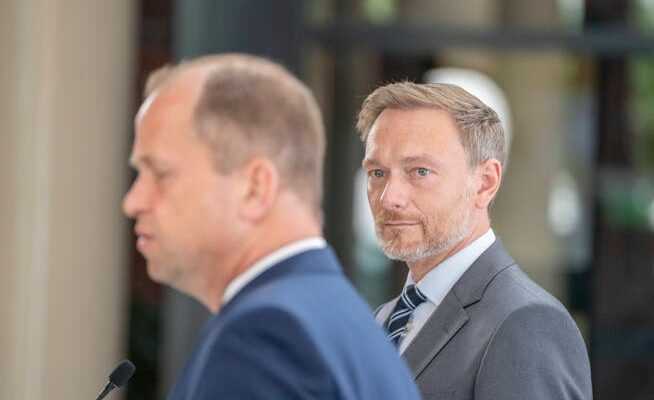The decline of the German Liberals in the recent state elections is no coincidence. As part of the federal government, Christian Lindner’s party is still involved in the greatest tax-financed nonsense.
This is what losers look like: FDP leader Christian Lindner (on the right in the picture) with Joachim Stamp, the party’s top candidate from North Rhine-Westphalia.

Marc Felix Serrao, Editor-in-Chief of the NZZ in Germany
You are reading an excerpt from the weekday newsletter “The Other View”, today by Marc Felix Serrao, Editor-in-Chief of the NZZ in Germany. Subscribe to the newsletter for free. Not resident in Germany? Benefit here.
After all, the German liberals are honest. FDP leader Christian Lindner described his party’s performance in the elections in North Rhine-Westphalia as a “disastrous defeat”. With a result of 5.9 percent of the votes, the party only just got over the five percent hurdle.
As a reminder: in 2017 the FDP came to 12.6 percent in the most populous federal state. The current result corresponds to a slump of more than 50 percent. And it’s not the only disaster. In the far north of the republic, in Schleswig-Holstein, the party got 6.4 percent two weeks ago – after 11.5 percent in the previous election.
Of course, country-specific problems can always be identified afterwards. In North Rhine-Westphalia, for example, the FDP’s top candidate, Joachim Stamp, was seen as a pale figure. The party’s Minister of Education there, Yvonne Gebauer, also received a lot of criticism during the pandemic and caused confusion with quick changes to the Corona rules.
But if a party falls flat on its face within a few weeks in two very different federal states – sparsely populated and rural here, crowded and multicultural there – and as a member of different government constellations – once with the CDU and the Greens, once with the CDU alone – it has to there are other, more relevant reasons.
Lindner’s fateful words
“It is better not to govern than to govern wrongly.” With these words, Lindner justified his no to a coalition with the Union and the Greens in the federal government in 2017. Four years later, that worry didn’t just go away. Suddenly, Lindner even believed that as the smallest partner in a government with two left-wing parties, he could push through more liberal policies than he had previously on the side of the Union. The FDP will turn the so-called traffic light coalition with the SPD and the Greens into an alliance of the “middle”, he promised. puff cake.
Five months after starting work, the FDP is largely invisible in the government. And when she is responsible for decisions, it is not just about acting not about liberal politics, but about tax-waste populism of the darkest kind. The billion-dollar “relief package”, which Lindner has been defending verbally as Finance Minister for weeks, contains a one-time “energy price flat rate” of 300 euros for employees, among other things, a limited “fuel price brake” and a nationwide local transport ticket reduced to 9 euros a month for 90 days for everyone. The bureaucracy alone will consume hundreds of millions. And everything for a fizzled “money rain”.
Apart from that, the party makes a name for itself, if at all, with projects for which the FDP would not have needed it, at least not in the government: the planned legalization of cannabis, for example, or the reform of family law, away from the model “father, mother, child” and towards a “community of responsibility” with friends and roommates. The left-wing parties have also been dreaming of such reforms for a long time; The FDP can hardly score here, especially since older voters who recently ran away in droves from the party, which tried to be funky and digital.
Where’s the liberal proofreading?
Economic liberalism, budgetary discipline, reduction of bureaucracy: those would be unique selling points. The FDP was voted for by many. Junior partner in a left-left liberal government? Yes, but then as a recognizable proofreading.
A liberal finance minister with backbone would ask the chancellor, just as an example, in view of the war in Ukraine and the galloping inflation, to apply cuts in the coalition agreement wherever the two left-wing parties have written expensive patronage politics. So far, no additional expenditure in the minister’s so-called supplementary budget has been counter-financed by savings elsewhere.
But as I said, Lindner has at least recognized that his party’s situation is disastrous (unlike the SPD, which has literally been wiped out in Schleswig-Holstein and its former home state of North Rhine-Westphalia and whose Secretary General Kevin Kühnert still has “a lot of encouragement” for the chancellor fantasizes). FDP voters who want to be brave can use the party leader’s new awareness of the problem to create their very own relief package.
Follow the editor-in-chief of the “Neue Zürcher Zeitung” in Germany on Twitter.
